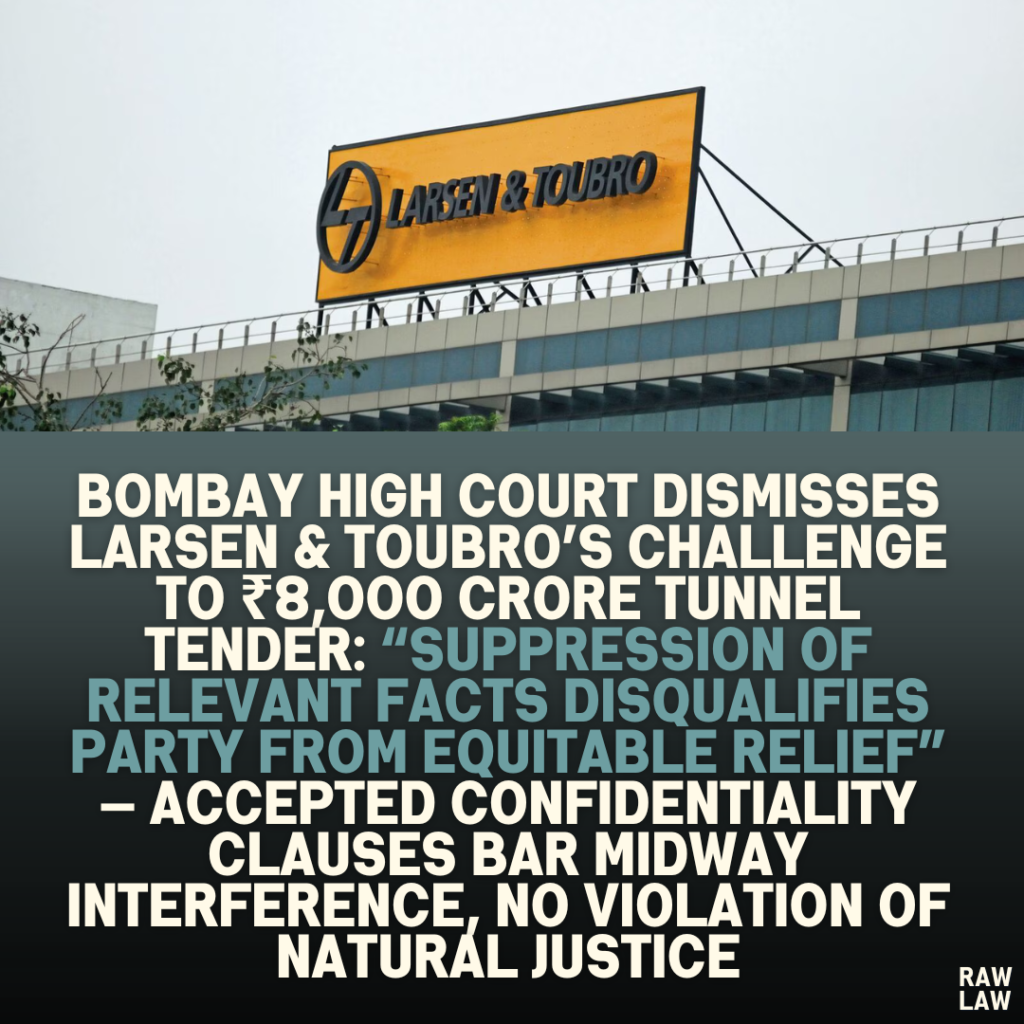Court’s Decision
The Bombay High Court dismissed a writ petition seeking to restrain the Mumbai Metropolitan Region Development Authority (MMRDA) from opening financial bids in the ₹8,000 crore Gaimukh–Fountain underground road tunnel project. The Court held that the petitioner had suppressed material clauses of the tender (Clauses 28.1 and 42.5), which barred disclosure of technical evaluation until the award of contract was communicated. The Court stated:
“The Petitioner having accepted Clause 28.1 and 42.5 of the ITB, cannot at this stage assert a right contrary to the express terms of the tender.”
The Court refused to restrain MMRDA from proceeding with bid opening and directed that:
“The interim stay on the opening of the financial bids is discontinued forthwith.”
However, the Court directed MMRDA to preserve the price bids for two weeks after communicating the contract award to the petitioner.
Facts
MMRDA issued a public tender on 27 July 2024 for the construction of a 5-km underground road tunnel as part of the Mumbai Coastal Road extension. The petitioner submitted its technical bid on 13 December 2024. The bids were opened on 1 January 2025, but the petitioner did not receive any communication regarding the outcome. Later, it came to know that financial bids were scheduled to be opened on 13 May 2025.
The petitioner contended that it was not informed whether its bid was responsive and was not invited to attend the financial bid opening. Alleging violation of natural justice and the tender terms, it filed a writ petition on 13 May 2025.
Issues
- Whether MMRDA’s conduct of opening financial bids without notifying the petitioner of its technical disqualification was arbitrary and violated the principles of natural justice.
- Whether Clauses 27.7 and 27.8 override Clauses 28.1 and 42.5 of the ITB, which restrict disclosure of evaluation results until the award stage.
- Whether suppression of material clauses by the petitioner barred it from equitable relief.
Petitioner’s Arguments
- Clauses 27.7 and 27.8 required MMRDA to notify non-responsive bidders and return unopened price bids.
- PWD Guidelines mandated disclosure of qualification results and reasons for disqualification, and allowed disqualified bidders to be heard.
- The Central Vigilance Commission (CVC) Guidelines required recording clear reasons for bid rejections.
- Reliance placed on:
- Haffkine Bio-Pharmaceutical Corporation Ltd. v. Nirlac Chemicals
- Surendra Infrastructure (P) Ltd. v. State of Maharashtra
- Reliance Energy Ltd. v. MSRDC
- FCI v. Kamdhenu Cattle Feed Industries
- Konkan Railway Corporation v. Union of India
- Asserted that not being informed about rejection deprived the petitioner of the opportunity to seek timely judicial review.
Respondent’s Arguments
- Clauses 28.1 and 42.5 of ITB clearly state that evaluation results shall not be disclosed until the award of contract.
- The petitioner suppressed these clauses and approached the Court with unclean hands.
- Cited K.D. Sharma v. SAIL to argue that suppression of material facts warrants dismissal.
- Relied on National High Speed Rail Corp. v. Montecarlo Ltd., where the Supreme Court upheld similar clauses as valid to avoid midway challenges.
- Argued that the project’s public importance necessitated minimal interference and speedy execution.
- The Solicitor General assured that reasons for disqualification would be shared post-award, and the petitioner could then challenge them legally.
Analysis of the Law
- The Court emphasised that clauses 28.1 and 42.5 formed part of the contract, and the petitioner could not now claim rights contrary to them.
- The law on judicial review in tender matters requires strict adherence to the tender’s terms unless mala fides or irrationality is shown.
- The Court held that acceptance of tender terms precludes parties from later challenging them on grounds of equity or fairness.
Precedent Analysis
- Montecarlo Ltd. was directly applied, wherein the Supreme Court upheld confidentiality clauses delaying disclosure till post-award.
- K.D. Sharma was relied upon to underscore that suppression of relevant facts disqualifies a party from equitable relief.
- Other judgments cited by the petitioner were distinguished as not applicable at the pre-award stage under the current ITB.
Court’s Reasoning
- The petition was silent on key clauses (28.1 and 42.5), which made it materially defective and suppressive.
- The Court found “much merit” in the respondent’s submission of suppression.
- Held that “no prejudice whatsoever would be caused to the Petitioner” since rights were preserved post-award, while delay would prejudice the public project.
- Noted that “even assuming there has been a delay” in MMRDA’s technical evaluation, that did not justify interference.
Conclusion
The writ petition was dismissed. The Court discontinued the interim stay on bid opening. It held:
“The Petitioner’s reliance on the judgments… would be of no assistance at this stage.”
However, it granted the petitioner’s request to preserve electronic price bids for two weeks after award communication.
Implications
- Upholds the primacy of contractual clauses in public tenders over general principles of fairness unless mala fides are established.
- Reinforces that pre-award challenges based on non-disclosure are barred when confidentiality clauses are accepted by the bidder.
- Balances bidder rights with public interest by preserving the right to challenge post-award while avoiding delays in mega infrastructure projects.




Pingback: Bombay High Court Upholds BMC’s Demolition Notice on Mercedes-Benz Workshop Premises But Restricts Action to Illegal Additions — “Extensions So Extensive, It’s Difficult to Distinguish Old from New; Demolition Must Spare Original Structure and Per